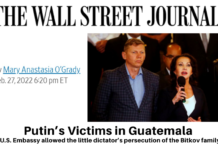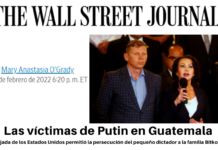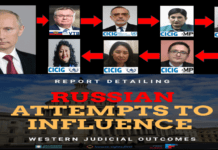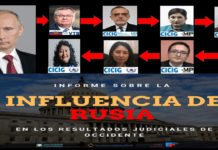
It’s been two months since Guatemala’s Constitutional Court cleared a Russian migrant family of all criminal charges related to their use of illegally issued documents. The April 25 high-court exoneration of Igor Bitkov, his wife, Irina, and their daughter, Anastasia, was widely heralded, including in this newspaper.
Yet the Bitkovs still aren’t free.
That’s because the same court now says that Igor Bitkov has to stand trial again on related charges. The cases of Irina and Anastasia remain in limbo. All three are out of jail but confined to Guatemala City.
The Bitkovs’ story deserves to be further aired in the U.S. press because their continued persecution comes at the hands of a United Nations agency—the Commission against Impunity in Guatemala, or CICIG—that is funded by the U.S. and itself operates with impunity.
Recall that the entrepreneurial Bitkovs fled Russia in 2008 because the Kremlin was trying to put them in prison for refusing to cooperate with Putin extortionists. The Russian state-owned VTB bank followed the family to Guatemala and hired the local law firm of Comte & Font to bring charges. VTB’s Guatemalan lawyers couldn’t prove the $6 million fraud allegation. But CICIG went to court in support of VTB’s effort to put the family in jail for using fake documents received from Guatemalan migration offices.
It can’t be a coincidence the high court’s April ruling that the Bitkovs had no criminal liability came two days before Rep. Chris Smith (R., N.J.), co-chairman of the Helsinki Commission, was to hold a public hearing in Washington about the case. The hearing promised to expose CICIG’s nasty role—including collusion with the Russian government—in the travesty suffered by the Bitkov family.
Immediately after the high-court decision, CICIG apologists launched a full-court press on Capitol Hill to cover up the U.N. agency’s many transgressions. William Browder, who has been working on behalf of the Bitkovs and was preparing to testify at the hearing, told me by telephone from London last week that he was asked by congressional staffers in Washington to meet with Alfonso Carrillo, a Guatemalan lawyer.
He says that Mr. Carrillo tried to convince him that CICIG is doing “really good work and that whatever I said in the hearing, not to speak negatively about CICIG.” Mr. Browder says Mr. Carrillo didn’t reveal that he had been given power of attorney by Russia’s state-owned Gazprombank. Nor, Mr. Browder says, did Mr. Carrillo tell him that when Guatemalan President Jimmy Morales declared CICIG lead prosecutor Iván Velásquez persona non grata in Guatemala for politicizing the CICIG mandate, Mr. Carrillo had been one of several lawyers who filed for an injunction to block it.
Mr. Carrillo told me by email on Friday that Gazprombank gave power of attorney to several lawyers at his firm. He said he never accepted or acted on it—and it expired in 2015. He also said neither he nor his firm have ever been paid by CICIG. Mr. Carrillo didn’t respond to specific questions and said he needed more time.
Henry Comte of Comte & Font, which was retained by VTB bank in 2012, has been an alternate on the Constitutional Court since 2016. In an email to me in March, his partner David Font told me that Mr. Comte had recused himself from any court hearings dealing with the Bitkov case.
Lower-court judge Erika Aifan challenged the April 25 high-court ruling to release the Bitkovs, and CICIG supported her challenge. On June 21 the Constitutional Court did an about-face to satisfy both parties.
It ruled that by attaining a driver’s license and credit cards Mr. Bitkov committed separate crimes. It ordered a new trial.
This is nonsense. An immigrant, believing he is legal, will naturally take the next step to drive a car legally and access credit. What’s more, the U.N.’s Palermo Convention, to which Guatemala is a signatory, and the Guatemalan migration code protect migrants who are victims of fraud while entering, staying in or leaving a country.
CICIG supporters say it has done some good. In the “migration case” it busted small fries in a crime ring inside government offices. But it never got the big fish. And even if it had, that’s not carte blanche to flout the law. Scores of Guatemalans are languishing in jail without trials under CICIG investigations.
Some in Washington get it. A senior congressional aide told me that the “State Department is sharply divided over CICIG,” with Trump appointees arguing that the “hold” requested by Florida Sen. Marco Rubio on $6 million of CICIG funding be used to “leverage reform of an out-of-control agency.” The aide added: “Still, a group of career diplomats are fighting to completely deny all evidence of CICIG’s complicity in the gross injustice to the Bitkovs, as well as its politicization and loss of credibility in Guatemala.”
Who knew the human rights of migrants were such a low priority for congressional staffers and Foggy Bottom?
Write to O’[email protected].







